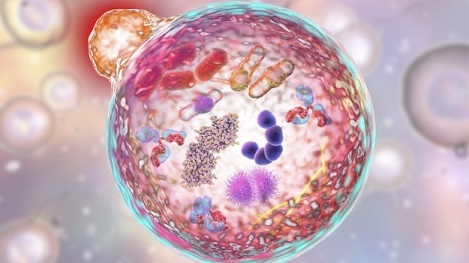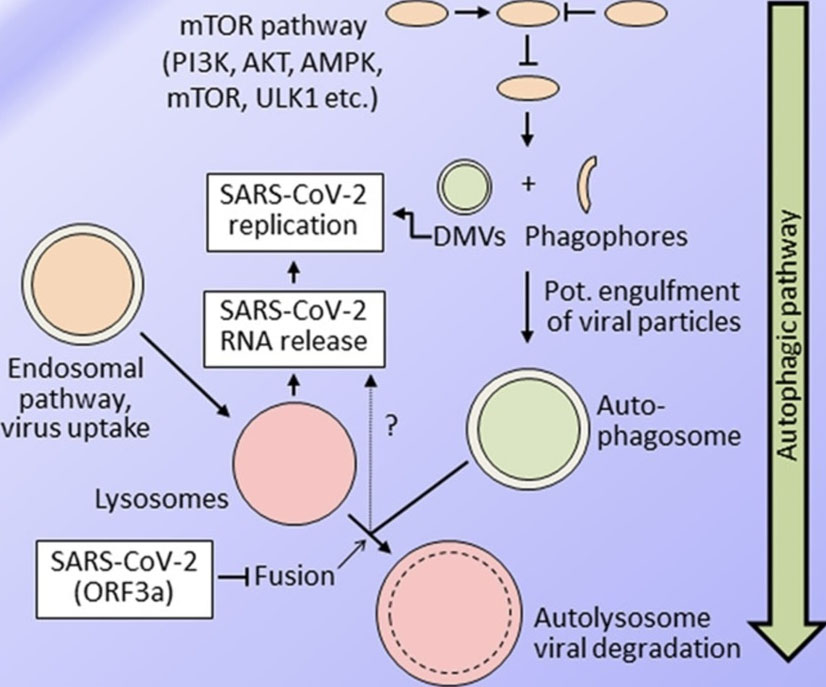German Researcher Highlights The Importance Of Autophagy In Fighting SARS-CoV-2 Infections And Identifies Drugs That Could be Repurposed To Treat COVID-19
Source: Autophagy-SARS-CoV-2 Oct 26, 2021 3 years, 6 months, 9 hours, 36 minutes ago
Autophagy-SARS-CoV-2: A review published by a researcher, Dr Theo Rein from the Max Planck Institute of Psychiatry, Munich-Germany in the peer reviewed Journal of Cellular Biochemistry highlights the importance of autophagy in the fight against SARS-CoV-2 infections and also identifies potential drugs that could be repurposed to treat COVID-19.
https://onlinelibrary.wiley.com/doi/10.1002/jcb.30166

Repurposing existing approved drugs with known safety profile is an attractive option for identifying new treatment strategies, in particular in extraordinary situations of urgent need such as the current COVID-19) pandemic.
The World Health Organization recently announced testing of three drugs (infliximab, imatinib, and artesunate in the Solidarity program) as potential COVID-19 therapeutics that are known for their dampening effect on the immune system. Thus, the underlying concept of selecting these drugs is to temper the potentially life-threatening overshooting of the immune system reacting to severe acute respiratory syndrome coronavirus-2 (SARS-CoV-2) infection. This viewpoint discusses the possibility that the impact of these and other drugs on autophagy contributes to their therapeutic effect by hampering the SARS-CoV-2 life cycle.
https://europepmc.org/article/med/33963326
Despite widespread vaccination campaigns are currently in progress around the world in an effort to control the COVID-19 pandemic, emerging variants and sub-variants that are immune evasive are beginning to challenge the whole exercise.
Also, although vaccination poses an appreciable prophylactic measure to prevent SARS-CoV-2 infections, the scientific community is still struggling to develop a robust treatment to cure already infected COVID-19 patients.
While vaccines were rapidly developed and marketed with unprecedented swiftness, drug development has traditionally been much more time extensive.
Taking into account the acute urgency, drug repurposing has emerged as a promising strategy that is already being followed or tested in several preclinical and clinical trials.
In this current
Autophagy-SARS-CoV-2 review, German researcher Dr Theo Rein discusses autophagy as a potential contributing mechanism of selected drugs that are currently being evaluated under the World Health Organization (WHO) Solidarity program in the treatment of COVID‐19.
The word autophagy is derived from Greek words “auto” meaning self and “phagy” meaning eating. Autophagy is a normal physiological process in the body that deals with destruction of cells in the body
. Autophagy is an evolutionarily conserved intracellular self-degradative process that plays a crucial housekeeping role in removing misfolded proteins, clearing damaged organelles, as well as eliminating intracellular pathogens, including viruses.
It has been found that during autophagy, cellular elements destined for degradation are engulfed by a double‐membrane structure called an autophagosome. These autophagosomes eventually fuse with lysosomes producing autolysosomes, where degradation takes place. The rate of autoph
agic degradation through this degradative cascade is known as “autophagic flux.”
The whole entire process of autophagy is tightly controlled and executed by a vast array of proteins. Given its involvement in various pathological conditions including viral infection, scientists across the world are trying to develop drug compounds that target proteins in the autophagic cascade.
Interestingly double‐membrane structures derived from the endoplasmic reticulum, which are typically required for the initial steps of autophagy, are contrived to serve as replication sites by coronaviruses. In addition, non-structural proteins of coronaviruses induce the formation of these double‐membrane structures.
https://journals.plos.org/plosbiology/article?id=10.1371/journal.pbio.0060226
https://pubmed.ncbi.nlm.nih.gov/18725538/
https://www.jbc.org/article/S0021-9258(17)47665-4/fulltext
https://www.cell.com/cell-host-microbe/fulltext/S1931-3128(10)00176-9
https://pubmed.ncbi.nlm.nih.gov/20088951/
https://pubmed.ncbi.nlm.nih.gov/21799305/
Aside from maneuvering early steps, coronaviruses can also interfere with the late steps of autophagy to evade degradation. Regarding SARS-CoV-2, the ORF3a protein has recently been reported to inhibit the fusion of autophagosomes with lysosomes. As a result, ORF3a increases autophagosomes but decreases autophagic flux, thus providing an escape from autophagy.
https://pubmed.ncbi.nlm.nih.gov/33422265/
 SARS-CoV-2 replication and endosomal/autophagic pathways, simplified scheme. Current knowledge supports both beneficial and detrimental effects of the autophagic pathway for SARS-CoV-2 replication. A major entry route for the virus is endocytic uptake, which requires lysosomal acidification for viral RNA release. The autophagic pathway is a multifactorial and multistep pathway with a vast range of possibilities for pharmacological targeting. In the more initial phases, phagophores, and double-membrane vesicles (DMVs) are formed, most likely from the endoplasmic reticulum, possibly also promoted by some coronavirus proteins. SARS-CoV-2 replication takes place at the endoplasmic reticulum as well, at very similar, if not identical, membrane structures. SARS-CoV-2 inhibits the last step of autophagy leading to viral degradation, that is, the fusion of autophagosomes with lysosomes to form autolysosomes, thus inhibiting autophagic flux. Accordingly, compounds impacting autophagy are expected to be efficient in fighting SARS-CoV-2 only if they enhance autophagic flux
SARS-CoV-2 replication and endosomal/autophagic pathways, simplified scheme. Current knowledge supports both beneficial and detrimental effects of the autophagic pathway for SARS-CoV-2 replication. A major entry route for the virus is endocytic uptake, which requires lysosomal acidification for viral RNA release. The autophagic pathway is a multifactorial and multistep pathway with a vast range of possibilities for pharmacological targeting. In the more initial phases, phagophores, and double-membrane vesicles (DMVs) are formed, most likely from the endoplasmic reticulum, possibly also promoted by some coronavirus proteins. SARS-CoV-2 replication takes place at the endoplasmic reticulum as well, at very similar, if not identical, membrane structures. SARS-CoV-2 inhibits the last step of autophagy leading to viral degradation, that is, the fusion of autophagosomes with lysosomes to form autolysosomes, thus inhibiting autophagic flux. Accordingly, compounds impacting autophagy are expected to be efficient in fighting SARS-CoV-2 only if they enhance autophagic flux
Hence the author of the review emphasizes autophagy drugs to target promoting autophagy flux rather than other aspects of the cascade.
Collectively, coronaviruses benefit from the early steps of the autophagic pathway but are vulnerable to increased autophagic flux. This finding is supported by previous reports showing that induction of autophagy has the potential to fight coronavirus infection.
Dr Rein told Thailand Medical News, “As autophagy is a conserved mechanism operative in most cells, pharmacological induction of autophagy has the potential to fight SARS‐CoV‐2 in all organs that are reached by the compound.”
The World Health Organization initially launched the research program “Solidarity” in 2020 to test four compounds as options for antiviral treatment, namely remdesivir, interferon β1a (IFN- β1a), hydroxychloroquine, and a combination of lopinavir and ritonavir. Unfortunately, an interim report of the study including 11,330 COVID-19 patients revealed little or no effect.
However, a more recent initiative in the Solidarity program evaluates three established immunomodulatory drugs including infliximab, imatinib, and artesunate. These drugs are selected on the rationale of restricting the damage caused as a result of an exaggerated immune response or cytokine storm, rather than trying to fight the SARS-CoV-2 directly.
The researcher of the current study points to the potential involvement of autophagy in the action of these following drugs, which may play a more prominent role than generally acknowledged.
1.Imatinib
Imatinib is an ABL tyrosine kinase inhibitor used to treat chronic myeloid leukemia. Several studies report an autophagy-inducing effect of imatinib, including the assessment of autophagic flux. Nevertheless, more studies are needed that apply a broader range of autophagic flux assessments to solidify the conclusion that imatinib induces autophagy.
2.Artesunate
The drug artesunate is a derivate of artemisinin that has established antimalarial and potent anticancer effects. This drug was added to the WHO’s Solidarity program because of its effects on the immune system. Several studies have reported the mechanism of autophagy induction by artesunate, with some reporting enhanced autophagy flux as well.
3.Infliximab
Infliximab is a chimeric antibody targeting tumor necrosis factor α (TNF-α) used in clinical practice to treat autoimmune diseases like Crohn's disease. Recent reports on drugs including infliximab that are either approved or in a clinical trial to treat Crohn's disease suggest autophagy induction as a relevant mechanism contributing to its effect. However, more studies are needed to specifically investigate the effect of infliximab on autophagy.
The author also highlights another drug with anti-SARS-CoV-2 potential:
Fluoxetine
To date there is growing evidence that COVID-19 patients benefit from treatment the antidepressant fluoxetine. Studies on COVID-19 patients receiving a fluoxetine have shown a reduced risk of intubation and deaths, reduced hospitalizations, and a lower likelihood of clinical deterioration. In fact, one recent preclinical study found the antidepressant fluoxetine as an inhibitor of SARS‐CoV‐2 in human lung tissue.
Fluoxetine is known to exert its beneficial effects by reducing the risk of the often fatal cytokine storm. However, it induces autophagy as well. Thus, its effect on autophagy might not only be important for treating depression but also to fight SARS-CoV-2.
The review author also highlights the possibility that the three drugs recently added to the WHO Solidarity program may not just prevent a life-threatening cytokine storm during SARS-CoV-2 infection but may also potentially limit SARS-CoV-2 replication through activating autophagy.
Dr Rein added, “The interaction of SARS‐CoV‐2 with the autophagic pathway is complex, with evidence for both the virus taking advantage of the autophagic pathway and trying to tame the full activity of this pathway to prevent its degradation. It is obvious from this scenario that it will be essential to learn how exactly the SARS‐CoV‐2 life cycle is intertwined with the autophagic pathway. Future research should include all known forms of autophagy, such as macroautophagy, microautophagy, chaperone-mediated autophagy, secretory autophagy, and so forth. This also applies to better understanding the action of to be repositioned or new drugs at each level of the autophagic pathway.”
For the latest on
Autophagy and SARS-CoV-2, keep on logging to Thailand Medical News.

